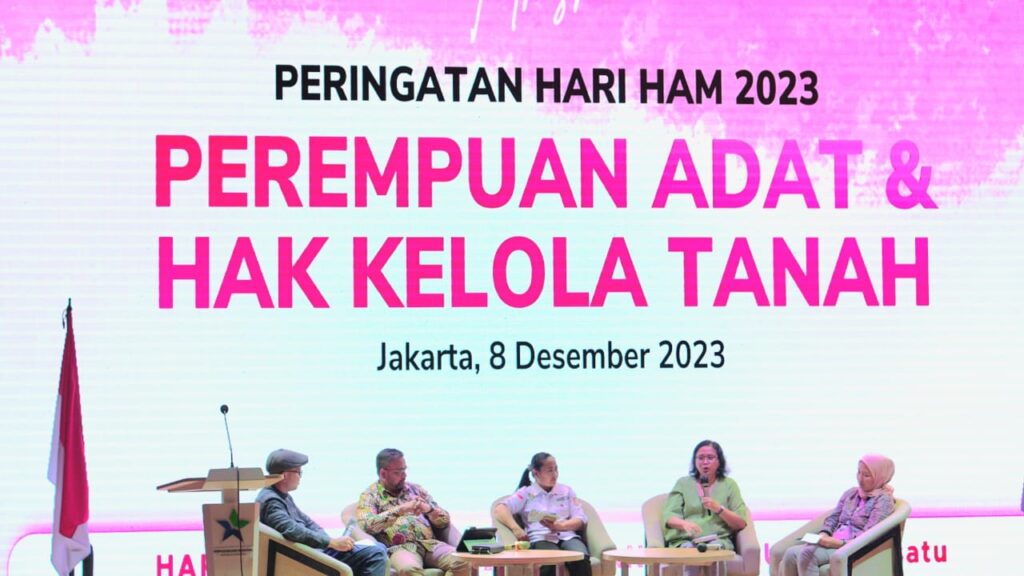KEMITRAAN as a partner of the National Commission (KOMNAS) on Human Rights (HAM) held a talk show with the theme "Traditional Women and Land Management Rights" as part of a series of commemorations of International Human Rights Day 2023, on 8 December 2023. This event took place at the National Library Auditorium ( National Library) Republic of Indonesia, Jakarta.
This talk show is not only a reminder of human rights, but also a forum for building public awareness regarding the fulfillment of indigenous women's rights in managing land, a space that is very vital in their lives.
This talkshow was attended by a number of speakers, each of whom was a traditional community leader, Yarni Ijo, as well as the Head of Lonca Village and the To Kulawi Traditional Woman, Sigi. Not to forget, Budhis Utami from KAPAL Perempuan, Gatot Ristanto as a representative of Komnas HAM, and Ronna Nirmala from Project Multatuli. This discussion was moderated by Arif Nurdiansyah from KEMITRAAN.
Yarni Ijo, as the first speaker, shared her unique experience in changing the paradigm of women's participation in development forums. As Village Head, Yarni Ijo decided not to start a village Development Conference (Musrembang) if the number of women and men was not equal. This action aims to ensure that women are fully involved in village development decision making.
Furthermore, Yarni Ijo discussed the role of To Kulawi traditional women in land management using local Pampa traditions. Pampa is wisdom passed down from generation to generation that gives women the authority to manage land. In Lonca Village, indigenous women work together to clean and plant Pampa land, creating economic benefits that can be used to pay for children's education.
The discussion continued with Ronna Nirmala from Project Multatuli, who highlighted the role of the media in encouraging the fulfillment of indigenous women's rights. The Indigenous Women's Window, a media platform, seeks to discuss the relationship between indigenous women and land. Ronna conveyed the importance of paying special attention to them and ensuring the media gives them a voice.
Meanwhile, Gatot Ristanto from Komnas HAM highlighted the challenges of protecting indigenous women's rights, especially regarding land ownership. Although there is a legal framework that guarantees human rights, there are only 68 recognized indigenous peoples in Indonesia. Agrarian conflicts and violence continue to occur, limiting the living space of indigenous communities.
"Regulations regarding state-managed forests prohibit anyone from entering the forest area, even though indigenous peoples have lived in that area even before the state was formed. They depend on the forest, they eat from the forest. The living space of indigenous communities is then limited by HGU and companies. Agrarian conflicts arise from development priorities, such as the cases of Mandalika, IKN, Rempang where there are indigenous communities. Indigenous communities should be seen as a whole. Providing houses and relocating them is not a solution, there is neglect of their very valuable culture. "These problems must be minimized so that the rights and existence of indigenous peoples are not disturbed," he stressed.
Budhis Utami from KAPAL Perempuan presented the good practices of Women's Schools as a space for women to fight for collective rights. KAPAL encourages indigenous women to amplify their voices and get involved in village forums and organizations. Buddhists also emphasize the importance of seeing the benefits for themselves in land management rights.
“What must be done is to amplify women's voices and that requires courage. For example, traditional women must be able to question traditional regulations that do not provide space for women's voices, such as at weddings where the decision on the size of the dowry is only determined by traditional elders and the male family, or how discussion areas such as gazebos are only filled by men. while the women sit below, on the ground, and just prepare food. Through the Women's School, we encourage women to be involved in the preparation of the Village APBDes and Village RPJMN. "Our challenge is that there are still no regulations regarding early marriage and sexual violence, which often affects women, even at the village level," said Budhis.
The discussion reached the conclusion that to increase the fulfillment and protection of indigenous peoples' human rights, recognition of indigenous peoples is needed, increased multi-stakeholder cooperation, a review of regulations and policies related to human rights and indigenous peoples, as well as a more active media role in taking sides with indigenous peoples.
By holding this talk show, it is hoped that it can trigger critical public awareness of the situation of indigenous women in land management rights. Hopefully, this discussion can trigger new movements that support the rights and existence of indigenous peoples in Indonesia.
*This article was written by: Meilisa Anggraeni_Estungkara Internship Student_FISIPOL UGM 2023


